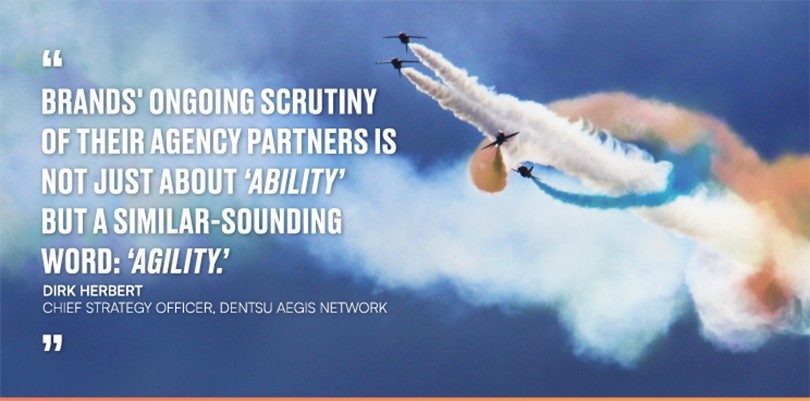The Real Reason CMOs Are Reevaluating Their Agencies
Editor’s Note: This guest post was contributed by Dirk Herbert, US Chief Strategy Officer, Dentsu Aegis Network. A previous version of this post originally appeared on LinkedIn.
2018 has been the year of the media review. More of the top 350 advertisers in the United States have put their account into review than ever before, according to RECMA, a research company evaluating the media agency industry. All told, upwards of $9.5 billion in U.S. media spend has been in play this year so far.
It turns out brands' ongoing scrutiny of their agency partners is not just about “ability” but a similar-sounding three-syllable word: “agility.” It's part of a transformation effecting every part of the enterprise and is much bigger than media and marketing.
What’s going on? "It has to do with [agencies'] ability to optimize quickly," the IAB's Orchid Richardson explained.
Earlier this year, Dentsu Aegis Network fielded a study of 1,000 CMO's in 10 global markets to gauge their attitudes to agencies, in-housing and talent. The results were surprising.
Turns out, CMO’s feelings toward agencies were warmer than some might expect. Only one in five U.S. CMO's complained about "lack of integration of agencies." Only 13% predicted that a top barrier to consumer relationships in the next two to three years would be agency capabilities.
What is significant is that when the CMOs called agencies out, it wasn’t on their skills, but rather on performance and efficiency metrics that are aligned to the outcome CMOs really want: agility. This finding aligns with a recent Forrester report titled, “Agencies Need A Brave New Business Model,” that called on holding companies to, among other things, adopt more flexible staffing models, similar to those used by consulting firms.
The traditional retainer model works well in a predictable environment, as agencies can function as extensions of a brand with relationships stretching into years. But it needs to evolve in a world where new channels, formats, consumer behaviors and regulations are impossible to foresee and advantage flows to the fastest. This reconfiguration of teams, talent and processes is part of a broad recasting of every capability in the enterprise.
As usual, the engineers got here first. At some point in 2001, 17 visionary software developers gathered in Snowmass, Utah, and hammered out the Agile Manifesto. Revolting against rigid processes, they built a more flexible approach that adapted to chaos.
Today’s CMOs feel their own need for speed. To thrive, agencies will have to adapt their models likewise.
So how can agencies adapt to the CMO’s needs? The survey fielded by Dentsu Aegis Network suggests three areas:
- Provide bespoke solution teams: Holding companies need to work harder to integrate client-facing teams – not around agencies and capabilities but client challenges. Consulting firms (which are becoming significant competitors) are historically good at staffing project teams based on the skills needed, not practice affiliation. Integration widens the talent pool and helps address the desire of 43% of U.S. CMOs to reduce the number of different agencies they use, per the Dentsu Aegis Network CMO study.
- Contract Specialists: An increasing number of marketing projects require specialized skills, such as data engineering or media mix modeling. While complex and important, they often fit neither within the CMO’s staffing plan nor the agencies’ statement of work. Given that 60% of U.S. CMOs in the study said they will increase the use of such contractors in the future, it’s in the agencies’ interest to either provide them directly or act as a broker, maintaining primary client contact.
- Support Disruption: Marketers want to control their own destiny, which at times means abandoning what worked in the past. U.S. CMOs were almost twice as likely to say a primary role of marketing is “leading disruptive innovation” and twice as likely as European CMOs to embrace “business transformation.” Rather than fearing the impulse, agencies should become a partner in shaking things up. This starts by agencies understanding that in a consumer-led world, the remit of marketing and marketing partners is no longer to change consumer behavior (consumers are doing that just fine on their own) but to change brand behavior to align with the evolving expectations of modern consumers.
It's obvious that the agency-marketer dynamic is changing. Rules are renegotiated monthly, and nobody knows exactly where they will land. But recent volatility makes a lot more sense when it is seen in the context of the decades-long imperative for digital transformation.
When those visionary engineers gathered in Utah, they ignited a flexible process that could – in the words of the Manifesto – “harness change.” Today’s CMOs are no less committed to the same idea. In order to both survive and thrive, agencies must be equally focused on agility and all of the benefits that come with it.
To keep pace with the latest thinking in the agency and marketing worlds, subscribe today to the LinkedIn Marketing Blog.
Topics: Content marketing Agency Trends, tips, and best practices
Related articles






